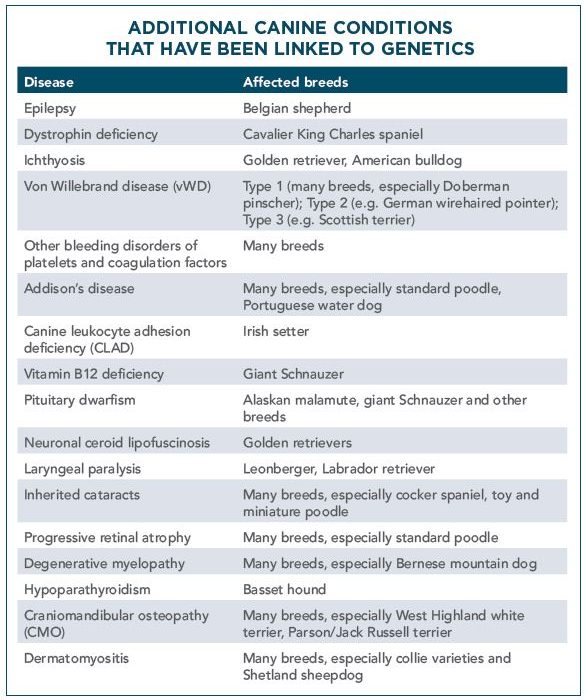What genetic testing can tell you about your dog or cat

Is your pet prone to developing certain health problems? Genetic testing can help you find out.
Depending on your dog or cat’s breed, or mix of breeds, he may be susceptible to developing particular health conditions during his lifetime. But how do you know, especially if you’re not sure what his ancestry is? Thanks to our growing understanding of genetics, together with advances in technology, you can now use genetic testing as a way to identify your animal’s breed makeup, and determine what his risk is for certain health problems.
Some science to get you started
Current science aims to integrate genomics (gene expression) with genetics (predisposition, or the DNA genomic “blueprint”) and epigenetics (programming or imprinting). Epigenetics studies how the genome is programmed for health and longevity. Genetic and epigenetic markers define predisposition and susceptibility to disease, and require study of the epigenome, which is tissue- and stage-of-life-dependent, and varies markedly between individuals and species.
Genes make up just 2% of the genome. Humans, cats and dogs have about 22,000 genes. The remainder of the genome (98%) holds the vast majority of information that programs the genes and controls gene expression.
Most dog breeds don’t share genetic determinants
Today, there are nearly 400 domestic dog breeds with unique histories and genetic profiles. Breed prototypes have been forming through selective pressures since ancient times, depending on the jobs they were most required to perform. In a recent major study of 161 dog breeds, the authors observed that the majority of breeds either do not share large haplotypes (DNA signature sets of genetic determinants located on a single chromosome) outside their clade (group comprising all evolutionary descendants of a common ancestor), or else they share them with only one remote breed. The data supported the existence of 23 clades of breeds representing breed types that existed long before the advent of breed clubs and registries.
 The role of genetics in canine hypothyroidism
The role of genetics in canine hypothyroidism
Hypothyroidism is a complex clinical condition quite commonly found in both humans and dogs. It’s believed to be caused by a combination of genetic and environmental factors (for more on the environmental causes of this disease, see page xx).
Studies from the early and mid-2000s, performed by multi-breed analyses of predisposing genetic risk factors for hypothyroidism in dogs, identified three high-risk breeds — the Gordon setter, Hovawart and Rhodesian ridgeback. Using a genome-wide association approach and meta-analysis, researchers found that a major hypothyroidism risk locus was shared by these breeds on canine chromosome 12. This breed-shared risk haplotype included three genes that had not been previously identified as candidate genes for canine hypothyroid disease.
Other genetic markers for canine thyroid disease have been associated with the canine CTLA-4 gene in the following breeds: boxer, English setter, Labrador retriever, Rhodesian ridgeback and their crossbreeds. At least six chromosomes are involved. Other affected breeds include the giant Schnauzer, Alaskan Klee Kai, Doberman pinscher, bearded collie, Eurasier, Nova Scotia duck tolling retriever, Kerry blue terrier, and Irish water spaniel.
Purebreds more likely to have recessive diseases
In 2018 and 2019, scientists examined the frequency and distribution of 152 genetic disease variants in over 100,000 mixed breed and purebred dogs. This represents the largest dog DNA study published to date. The results showed that:
- Only 3% had a genetic disease, but 38% were carriers for a recessive genetic disease.
- Purebred dogs were 2.8 times more likely than mixed breeds to have a recessive disease.
- Mixed breeds were 1.4 times more likely than purebreds to be carriers of a recessive disease.
The table on page xx lists more conditions shown by genetic testing to be associated with certain breeds.
Common disorders in cats – how many are genetic?
The most common health issues in cats affect the mouth, according to a very large recent study from of the University of Helsinki. The researchers found that among all cats, the category of disease with the highest prevalence included dental and oral diseases (28%), of which the most common were dental calculus and gingivitis, at 21% and 8% respectively.
Other disease categories with a high prevalence included skin disorders and urinary tract disorders (12%); digestive tract disorders (11%); ocular and musculoskeletal disorders (10%), and disorders of the genitals in female cats (17%).
The research group also identified nearly 60 additional illnesses specific to particular feline breeds. Only six of the identified diseases have known associated genetic mutations. Among other findings, the study revealed the prevalence of asthma among Korats, and a renal disease in ragdolls. When it comes to behavior, British shorthairs are calmer than many other breeds, while Turkish Vans and Bengals are more active and aggressive.
If your dog or cat is a mixed breed, then chances are you’re not sure what his ancestral makeup is. Genetic testing can help give you some answers — and also give you a heads up on which health issues he might be prone to — so you and your vet can take steps early on to help prevent or slow the progression of these problems.
Genetics testing laboratory services for pets
Animal Genetics, animalgenetics.us
Embark, embarkvet.com
HealthGene, healthgene.com
OFA, ofa.org
OptiGen, optigen.com
Paw Print Genetics, pawprintgenetics.com
VetGen, vetgen.com
Veterinary Clinical Pharmacology Laboratory, Washington State University, vetmed.wsu.edu/vcpl
Wisdom Panel, wisdompanel.com




